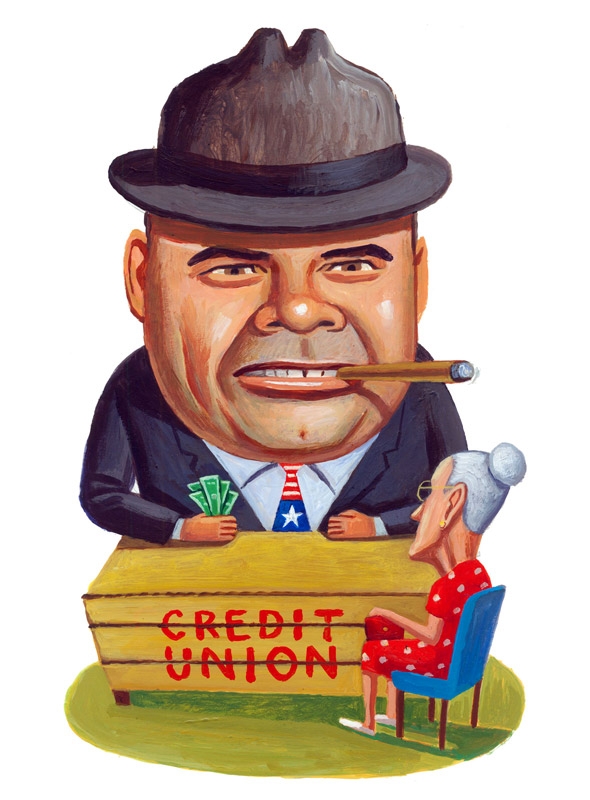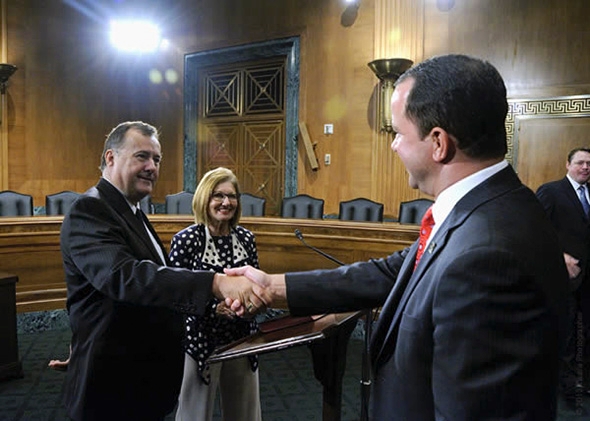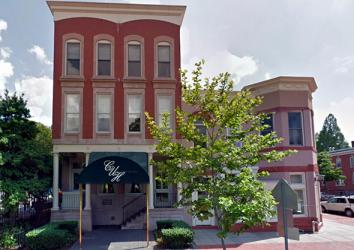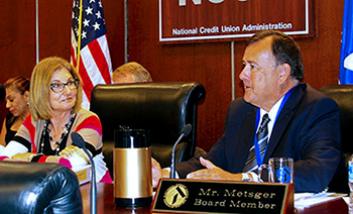Bad Credit
Credit unions look like mom-and-pop lenders. In truth, they make up a trillion dollar behemoth regulated by the same lawyers and lobbyists who once served these institutions.

Illustration by Charlie Powell
Minutes after Rick Metsger took the oath of office to become the newest overseer of the nation’s credit union industry, he walked a few blocks up the street to break bread with executives and lobbyists for the firms he now regulates. The luncheon in his honor was held at an elegant, $4 million Capitol Hill party and meeting space called Credit Union House. It drew a tightknit group of business leaders, advocates, and regulators—the most powerful people in a financial industry that holds more than $1 trillion in assets but which most Americans know little about.
Metsger, whose ascent they had gathered to toast, was one of their own, a fellow true believer in credit unions who would now police the industry as one of three board members of the National Credit Union Administration. He is typical of the regulators, lawyers, and lobbyists who make comfortable livings shuttling between overseeing and promoting the credit union industry. Together, they guard its wholesome reputation, forged during the Great Depression, when credit unions were set up to help poor people whom banks refused to serve.
Metsger had served on the board of his own credit union. He won a seat in the Oregon state Senate with the help of thousands of credit union volunteers and tens of thousands of dollars from the industry. A decade later, as chairman of a key committee, he helped pass legislation allowing credit unions to enter new lines of business. He worked as a paid consultant for a regional industry lobbying group even after President Barack Obama nominated him to the board in May. He ended the contract just weeks before he arrived in Washington to be sworn in on Aug. 23.
Ethics watchdogs question whether someone with such deep roots in an industry can cut through the wholesome, folksy rhetoric that its lobbyists use to push for weaker rules and less enforcement. As the NCUA board tries to fix the failures that led to a little-publicized industry-wide bailout in 2009, the concern is especially pressing. If the industry can persuade regulators to allow more risk in the system, the board’s decisions could plant the seeds of the next big taxpayer bailout.
“This is a person who is an advocate for the credit union industry, and he is now in charge of monitoring the credit union industry,” says Craig Holman, a lobbyist for Public Citizen, which advocates for transparency in elections and government. “It will be difficult for Metsger to question the industry’s perspective because he appears to share it in most respects.”
Metsger says he obtained approval from the agency’s ethics lawyers before attending the luncheon and paid out-of-pocket the $40-per-plate cost of food for him and his family.
After inquiries from the Center for Public Integrity, the NCUA’s inspector general is reviewing the lawyers’ advice to Metsger and revisiting the agency’s earlier analysis of any potential financial conflicts, according to Sharon Separ, who oversees investigations for the independent, internal watchdog office. A formal investigation would follow if the facts warrant it, she said.
Big Business
Credit union advocates work hard to cultivate the industry’s image as quaint and community oriented. In reality it’s a massive and growing business. In 2012, the nation’s 6,800-odd credit unions—with 94 million depositors—earned $8.5 billion in net income and held more than $1 trillion in assets. The biggest credit union, Navy Federal, holds $55.4 billion in assets and earned $792.3 million last year. It recently became the nation’s 20th-biggest mortgage lender.
Like banks, credit unions provide financial services such as deposit accounts and loans to consumers. Unlike banks, they are barred from risky activities that would not serve customers, like investing in most derivatives, and are exempt from paying most taxes. They are required to return excess earnings to their member-customers, for example by offering lower rates on loans or higher interest on deposits. The tax exemption is expected to cost the government $1.66 billion next year, according to the White House’s budget office.

New credit union overseer Rick Metsger (L) is congratulated by Northwest Credit Union Association CEO Troy Stang.
Photo courtesy NCUA
Much of that extra income is diverted to finance the industry’s advocacy efforts, reducing the benefits available for customers. Credit unions spent more than $600 million of their members’ money since 2008 on trade groups, lobbyists, political donations, naming rights to sports arenas, and other efforts to promote what they call “the credit union movement,” according to a new analysis of public documents by the Center for Public Integrity.
“This isn’t a charity, it’s big business,” says Marvin Umholtz, a former credit union executive who now consults for both credit unions and banks.
The National Credit Union Administration board is charged with supervising the industry and overseeing the $11.7 billion fund that insures credit union deposits, so that customers are protected if their lender fails. To prevent costly failures, the board monitors the industry and imposes sanctions on weak credit unions. In effect, the board controls how much risk the institutions can take on, and how quickly they can expand.
The board’s expansionist policies have helped credit unions add more than 11 million members in the past 10 years and boost lending more quickly than banks. Their assets have doubled since 2001.
“You can think of them as providing regulatory oversight, but you can also think of them as cheerleaders and enablers,” says Kathleen Clark, an expert in government ethics and professor at Washington University School of Law. It’s a common problem when regulators are “ideologically in line” with the companies they oversee, she says.
Interests Overlap
Metsger, like the other two members of the NCUA board, bounced straight from promoting credit unions to writing the rules for them. It is a typical trajectory inside the clubby world of the “credit union movement,” where regulators often embrace the view that credit unions are inherently good, and more credit unions are good for the United States.

Photo via Google Earth
Among the guests at Metsger’s luncheon was his new boss, NCUA Chairman Debbie Matz, a credit union executive between her two stints as a regulator. Troy Stang, CEO and lobbyist in Oregon for the Northwest Credit Union Association, organized the event—and had Metsger on his payroll until earlier that month. Bill Cheney, the industry’s top lobbyist in Washington, was a director of the two credit unions whose losses after the financial crisis led to a $19 billion taxpayer bailout.
A picture from the event shows the four locked in amiable conversation at Credit Union House, the swank party space built by lobbyists, for lobbying. How they handle issues facing the industry may set the stage for the next credit union crisis—or guarantee a safe and sound system for decades to come.
Metsger says his new job requires a different mode of advocacy, one focused on ensuring the industry’s financial strength. He says friendly gestures by industry advocates, like the luncheon celebrating him, won’t cloud his judgment as a regulator.
“You want to make sure you keep this arms-length, but you also need to have a dialogue with folks and you don’t want to make them feel like you’re in isolation—‘Oh, no, I can’t be seen with you,’ ” he said in an interview.
Cheney said the event made sense because the northwest trade association is a part owner of Credit Union House and Metsger had consulted for the group. “I don’t think that creates any undue influence with the regulator whatsoever,” Cheney said.
Mission Creep
Federal credit unions were set up during the Great Depression to serve working-class people who were being turned away by banks. The 1934 law that created them says they would provide credit for “people of small means … to stabilize the credit structure of the United States.”
The industry has strayed from that mission. Fewer than one-third of federal credit union members earn less than 70 percent of the median income in their community. Bank customers are more likely to be low-income than credit union customers, according to Federal Reserve data. At the same time, regulators are deeming a record number of credit unions “low-income” or “small,” designations that carry generous benefits, such as the ability to accept deposits from nonmembers and make more commercial loans. Changes in federal law also broadened the mission of the credit union system.
Credit unions have erected a sprawling advocacy machine to protect their tax break from attacks by bankers who believe it confers an unfair advantage. There are 43 leagues like the Northwest regional group; two major national lobbies—the Credit Union National Association and the National Association of Federal Credit Unions; charitable foundations; groups representing low-income, corporate, and other credit union subgroups; for-profit subsidiaries; quasi-independent companies like CUNA Mutual, which charges credit unions for services then pumps tens of millions back into their advocacy network; and even a think tank, the Filene Research Institute.
The groups collected more than $160 million in membership dues and other payments from credit unions from 2008 through 2011, the most recent year for which thorough data are available. That income helps pay for causes like Credit Union House, where dozens of political fundraisers are held each year. Four of the state credit-union leagues that own the house put up more than $300,000 apiece to help build it. Hundreds of credit unions and trade groups make annual donations. If you trace it back, all of that money comes from the pockets of credit union members who pay the fees and interest that make up a credit union's earnings.
Trade groups portray credit unions as humble Davids fighting dreaded banking Goliaths, sponsoring national ad campaigns with populist slogans like “Don’t tax my credit union.” One such ad, sponsored by the Credit Union National Association, tells viewers, “You didn’t save your money to make someone else rich”—a reference to banks, whose profits go to their shareholders.
Top executives at big credit unions, however, can pull down eight-figure pay packages and golden parachutes to rival all but the biggest banks. David Maus, CEO of the Public Service Employees Credit Union in Denver, was paid $11 million in 2010. Cheney, top lobbyist for the Credit Union National Association, received $1.3 million in compensation in 2012, tax filings show.
Promoting Growth, Adding Risk
When they’re not defending their special tax status, credit unions lobby for rule changes that would allow them to act more like banks, take more risks, and grow. And they often find sympathetic ears at the NCUA.
Chairman Matz, for example, has repeatedly urged Congress to allow credit unions to boost commercial lending. And she exempted many from the legal cap on business lending by helping them qualify as “low-income credit unions.” Between August 2012 and August 2013 alone, the number of credit unions in that group leapt 72 percent, from 1,140 to 1,961.
Most credit union managers lack the expertise to run prudent small-business-lending programs, says Jim Blaine, CEO of the nation’s second-biggest credit union by assets, State Employees’ Credit Union in Raleigh, N.C.
“If you’re going to go into it, you’d better be good, and there are very few credit unions that can do it at this point,” says Blaine, whose credit union has rejected members’ pleas to do commercial lending.
His view is borne out in government audits that have found that credit unions with business lending programs are more likely to fail.
’57 Chevy
Metsger’s devotion to credit unions bloomed early. When he was 19, he needed a car to get to his job scrubbing toilets at a local school in Oregon. Portland Teachers Credit Union lent him $350 to buy a used ’57 Chevy, and he was hooked. To this day, Metsger, 62, remains a member of the credit union and an aficionado of old cars. He worked as a teacher, then an investigative reporter, before a visit to Salem on behalf of his credit union board inspired him to run for the state Senate.

Photo courtesy NAFCU
“My issue was concern about citizens, ordinary citizens, having access to credit union services—low-cost financial services—so they can find a better life,” Metsger said in a 2010 political speech about his first campaign. “With the help of thousands and thousands of credit union volunteers and consumer advocates, I was successful.”
Metsger received roughly $120,000 in campaign money from the credit union industry during his 12-year political career, more than he got from any other industry. He defended the industry’s political spending after leaving office, as a paid consultant for the Northwest Credit Union Association, previously known as the Credit Union Association of Oregon. That group alone accounted for almost half of his donations from credit unions. Serving in Oregon’s Legislature is a part-time job. Between sessions, Metsger worked as a PR consultant for clients including several credit unions and the Credit Union Association of Oregon.
In the statehouse, he pushed several pieces of legislation aimed at strengthening and expanding the industry. He supported bills that would allow credit unions to take deposits from government agencies to bolster their capital cushions. He supported boosting their commercial lending, which can increase risk. And he advocated expanding the pools of people from which credit unions can draw their members. His work pleased the Credit Union Association of Oregon so much that in 2009 they named him “Legislator of the Decade.”
Backwater Bailouts
Metsger begins his job as regulator at a moment of upheaval for the National Credit Union Administration. The 1,262-employee agency is headquartered in a new brick building across from a train station in Alexandria, Va., about 7 miles south of the better-known bank regulators clustered around the White House and Treasury buildings. Its location, and the credit union industry’s relatively modest size, long rendered the NCUA a sleepy backwater of financial regulation.
Attention shifted to the NCUA after the financial crisis, when massive losses on risky mortgage bonds forced it to shutter five teetering “wholesale” credit unions whose failures would have upended the entire system. The regulator took them over, borrowing $19.2 billion from the government to bail out the system. It still owed about $3.9 billion as of last month.
But it was a policy change by the NCUA that helped lay the groundwork for the crisis.
Wholesale credit unions, also called corporates, provide short-term loans and investment services to retail credit unions. They traditionally served these customers in defined regions, but the board decided in the late 1990s to let them serve credit unions across the country, forcing them to compete with one another. Seeking to offer the highest returns, some corporates invested in complex, risky mortgage bonds that were at the heart of the 2008 financial crisis—threats that government auditors had warned about in 1995 and 2004.
Bill Cheney, the million-dollar CUNA lobbyist who attended Metsger’s luncheon, was sued in 2010 by the NCUA because he sat on the board of WesCorp, one of the biggest failures. The judge in the case later dismissed the charges against Cheney and the other directors. Cheney settled a separate lawsuit related to his service as a director of U.S. Central, the biggest failed corporate credit union.
Credit unions have spent $4.8 billion of their members’ money paying down the bailouts, on top of the $5.6 billion they lost in the failures. They could pay up to $3.9 billion more to close out the Treasury debt, according to NCUA estimates.
Cleaning Up and Scaling Up
Now the agency is under pressure to ensure there is no repeat of 2009. It has retooled the rules and oversight practices for corporates, imposing new risk management requirements and limits on how much of any single investment type they can buy. If one appears shaky, it will automatically trigger requirements to raise capital and cease paying dividends.
This get-tough campaign contrasts with the agency’s efforts to help credit unions grow and thrive. The regulator spent $5.5 million last year on an office that offers free, private consulting services to small credit unions and those designated as serving low-income members. A brochure of marketing tips from the office advises, “Encourage tellers and loan officers to cross-sell products at every touch point with the member.”
They also softened rules that defined distinct groups eligible for membership. Today, for example, anyone can join the NASA Federal Credit Union simply by agreeing to become a member, cost-free, of the American Consumer Council.
“There really are no longer any restrictions on membership,” says Blaine, the credit union CEO.
Among the agency’s key goals for 2012, according to its annual report: boost awareness of credit unions among young people; classify more credit unions as low-income, so they are subject to looser rules and extra subsidies; and increase the number of potential credit union members so the industry can keep growing.
There are no meaningful safeguards to prevent the NCUA from being completely filled with industry veterans and allies. By law, only one of the three board members can be a recent credit union employee or affiliate. None of the current board members count, agency spokesman John Fairbanks said.
Not Metsger, who was paid by a major trade group until the month he was sworn in. Not Michael Fryzel, who was a lawyer for credit unions until he was sworn in in July 2008. And not Matz, who was a senior executive at Andrews Federal Credit Union until roughly a year before she was nominated to her second stint on the board. Credit union industry groups don’t count for purposes of the rule and Matz took off just enough time to avoid being considered a recent employee.
Metsger said in an email that he avoids conflicts of interest by “never letting my associations … direct my decision-making,” and by seeking guidance from ethics lawyers.
Tension in the Family
Credit union lobbyists bristle at the idea that they wield too much influence over the regulator. As evidence, they cite issues on which they disagree with the NCUA. Trade groups, for example, have argued that closer inspection of credit unions’ lightly regulated subsidiaries would be unnecessary and invasive. In November, the board proposed new reporting requirements for the entities, some of which made shoddy loans that contributed to recent credit union failures.
CUNA and the regulator have locked horns more often since the crisis, Cheney says, because of all the new rules the board has imposed over industry objections.
“If there’s some sort of a family crisis, it can create tension in the family, and certainly we had a crisis in the financial services industry,” he says. “But any time the pendulum starts to swing, the question is, ‘When has it swung too far?’ ”
If the credit union industry has agreed with his decisions, Metsger said, that does not mean he made the decisions merely to please industry. He broke with the industry at least once, he notes, by supporting a 2007 proposal in the state legislature to curb risky and abusive mortgage lending that credit unions hated.
Metsger says he will continue to strike a “fine balance” in his new role, engaging industry stakeholders and hearing them out, but remaining focused on the agency’s mission—protecting the health of the credit union industry.
“I’m very cognizant of it,” he says. “That doesn’t mean you always guess exactly right, but you do the best you can.”
The Center for Public Integrity is a nonprofit, independent investigative news outlet. For more of its stories on this topic go to publicintegrity.org.
Correction, Dec. 11: Due to a production error, Rick Metsger was misidentified as the man standing on the right in a photograph on the first page. He is standing on the left.
